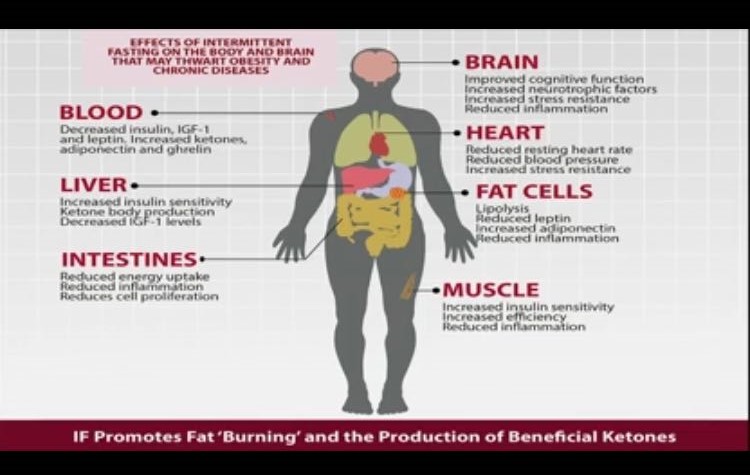
Whether your goal is weight loss, better blood sugar management, lower inflammation, a stronger immune system, cancer prevention, or simply a longer and healthier life, fasting may just be the best thing you could add to your regimen.
Fasting is one of the oldest therapies in medicine. Many renowned physicians throughout history and many of the oldest healing systems have recommended fasting as an integral method of healing and prevention.
Hippocrates believed that fasting enabled the body to heal itself. Consider how the body naturally reacts when fighting an infection. As our internal heat rises to kill off the infection, our appetite naturally declines so all our energy can be used to support the immune system and get us feeling better faster.
Historically, humans have lived in environments with fluctuating food availability. Evolution has selected for organisms that are able to withstand periods of starvation. If anything, fasting from time to time is more “natural” than eating 3-4 meals every day.
Health Benefits
Adaptation to starvation diverts energy into multiple protective systems in order to minimize the damage that would reduce fitness. This adaptation actually provides many benefits to the body.
When you fast, human growth hormone levels go up and insulin levels go down. Your body’s cells also change the expression of genes and initiate important cellular repair processes.
Weight Loss: Intermittent fasting can help you lose weight and belly fat, without having to consciously restrict calories. This is because of a combination of factors. The levels of human growth hormone (HGH) skyrocket, increasing as much as 5-fold. This has benefits for fat loss and muscle gain, in addition to tissue repair and anti-inflammatory immune activity. Lower insulin levels also make stored body fat more accessible. Because of these changes in hormones, short-term fasting may actually increase your metabolic rate by 3.6-14%. The amino acid leucine also increases, which can further help your body burn fat for energy.
Insulin resistance: Intermittent fasting can reduce insulin resistance, lowering blood sugar by 3-6% and fasting insulin levels by 20-31%. It also lowers Insulin-like Growth Factor (IGF-1). This can help protect against Type 2 Diabetes and as we learned in the blog on Sugar and Cancer can help decrease the risk for cancer.
Inflammation: Some studies show reductions in markers of inflammation, a key driver of many chronic diseases, including cancer. The increase in HGH and lowered IGF-1 also have anti-inflammatory effects.
Cancer: Intermittent fasting can decrease the risk of cancer by many factors, including improved insulin sensitivity and lowered inflammation. Cancer cells have 10-70 times more insulin receptors than normal cells. Fasting’s ability to improve insulin sensitivity is very important in reducing risk. It also may help to decrease tumor incidence as well as make cancer cells more vulnerable to both the immune system and cancer treatment. To read more about the research on fasting and cancer, feel free to check out the article I wrote for the UCSF Osher Center on this topic.
Cellular Repair: When fasted, your cells initiate cellular repair processes. This includes autophagy, where cells digest and remove old and dysfunctional proteins that build up inside cells. It also helps to remove viruses, parasites, and other microbes from the body.
Heart Health: Intermittent fasting may reduce LDL cholesterol, blood triglycerides, inflammatory markers, blood sugar, and insulin resistance. These are all risk factors for heart disease.
Brain Health: Intermittent fasting increases a protein called Brain-Derived Neurotropic Factor (BDNF), which is important for long-term memory. Fasting may also aid in the growth of new nerve cells, improve cognitive function, and even reduce risk for Alzheimer’s Disease.
Anti-aging: Intermittent fasting has been shown to extend lifespan in rats. Studies showed that fasted rats live as much as 36-83% longer. There are also changes in the function of genes related to longevity and disease protection, which play into it’s anti-again benefits.
 Slide was part of a presentation given by Dr. David Jockers on The Benefits of Fasting (10/14/16)
Slide was part of a presentation given by Dr. David Jockers on The Benefits of Fasting (10/14/16)
Many of these benefits have also been seen with long-term calorie restriction, however fasting seems to provide more dramatic results and without the risk of immune suppression or chronic underweight. The fact that short-term intermittent fasts also provide these results is great news to me as I know how hard it can be to make dietary changes, let alone follow a long-term fast.
Where to Start
Intermittent Fasting is not a diet. It does not dictate which foods we should be eating or not eating. It is simply an eating pattern that should be used alongside a healthy anti-inflammatory diet to get the most benefit.
Step 1: The first step towards integrating intermittent fasting into your routine is to start with a 12-hour nightly fast. So, if you ate dinner by 7pm then you wouldn’t eat breakfast until 7am the next day. This allows adequate time for the body to move through digestion and all the steps of detoxification before you start eating again. It also strikes a good daily balance between your building (eating) phase and your cleansing (fasting) phase.
Step 2: Once you’re able to follow this for a couple weeks then you can add 2-3 days per week where you extend the 12-hour fast to 16 hours. This could be as simple as skipping breakfast or eating dinner earlier. If you finish dinner by 8pm and then don’t eat again until noon the next day, this would give you a 16-hour fast. Or you could plan to eat dinner between 3-4 pm and then nothing until breakfast the next day between 7-8am.
Step 3: Once you’ve successfully integrated the nightly fast plus several days per week of the extended fast, the next step could be to integrate one of the following. There’s no one right way that works for everyone so experimenting will be the best way to find what works best for you. I personally like to do 2 days a week of the 16-hour fast combined with one 24-hour fast each week.
- Strong Fast: 16-18 hours
- Warrior Fast: 19-21 hours
- 1 Day Fast: 24 hours weekly
Step 4: The last piece to integrate is the occasional long fast. Based on the research around fasting and cancer it seems like you get the most immune system and detoxification benefit when you incorporate 72+ hour fasts several times a year. I personally think it makes the most sense to time these around the changing seasons; either twice a year at the autumn and spring equinox or four times a year with every seasonal change. You can read more about my personal experience with a 3-Day Fast HERE.
Other Tips
Hydration: Staying hydrated is extremely important while you are fasting! You should average 8-12 oz of water per hour during your fasting period (except while sleeping). Besides water you can drink coffee, tea, fresh veggie juice (no fruit), or bone broth.
Weight Loss: For those seeking weight loss you can enhance the benefits of intermittent fasting by following a low carb diet when you are eating. This also has the added benefit of making you less hungry, which in turn helps you stick with the fasting periods more easily.
Cancer: For those who are not overweight, be careful not to lower your total caloric intake so as not to lose weight. If you are pursuing cancer treatment, you may also want to time your fasts around your treatment, to help reduce treatment-related side effects. You can read more about this here and I would strongly encourage you to schedule a Free Planning Session with me if you’d like to pursue this further.
Cautions
If you are already underweight, or have a history of an eating disorder, then you should not do intermittent fasting.
There is some evidence that intermittent fasting may not be as beneficial for women, as it is for men. Only through experimentation and working with a qualified provider will you know for sure if it’s a good fit for you.
If you have a medical condition, then you should consult with a provider before trying intermittent fasting.
I also would not recommend intermittent fasting for women who are pregnant or breastfeeding or for children.
Get Support
As with any change in your dietary regimen it is always a good idea to obtain the advice and direction of an integrated provider who has experience in that area.
Start with the 12-hour nightly fast and when you’re ready to extend this further I invite you to schedule a Free Planning Session.
